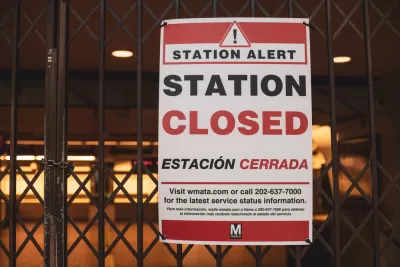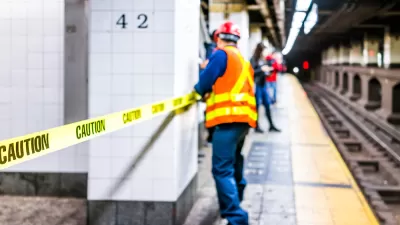The Washington Metropolitan Area Transit Authority couldn't wait for a still hypothetical bailout from Congress or the Biden administration.

The board of the Washington Metropolitan Area Transit Authority (WMATA) approved service cuts and an employee buyout plan to address the system's $176 million budget shortfall due to the coronavirus pandemic, report Justin George.
"The agency will offer retirement-eligible employees $15,000 to leave in hopes that several hundred workers will accept the incentive — part of an effort to shed 1,400 jobs," according to George. Metro's biggest employee union objected to the buyout plan, hoping the WMATA would wait until the Biden administration was in a position to deliver on promises to fund public transit.
As for the changes approved for service on the WMATA system, George offers this summary: "Among the changes that will begin around January are less-frequent train service on weekdays and the reinstatement of fares on Metrobuses."
"Service cuts will not include closing Metrorail two hours earlier, which was part of the agency’s initial plan. The agency also will not cut back on station managers or reduce the number of trains serving the Maryland suburbs. Metro decided to pull back on those proposals after receiving more than 5,000 public comments and because its financial outlook has improved since September."
The WMATA is far from alone in the fiscal crisis brought on by the coronavirus pandemic. News coverage earlier this month revealed plans for more than 9,000 layoffs and a 40 percent reduction in subway service at the New York Metropolitan Transportation Authority.
FULL STORY: Metro board approves budget cuts, buyouts as pandemic dents agency’s budget

Planetizen Federal Action Tracker
A weekly monitor of how Trump’s orders and actions are impacting planners and planning in America.

Maui's Vacation Rental Debate Turns Ugly
Verbal attacks, misinformation campaigns and fistfights plague a high-stakes debate to convert thousands of vacation rentals into long-term housing.

San Francisco Suspends Traffic Calming Amidst Record Deaths
Citing “a challenging fiscal landscape,” the city will cease the program on the heels of 42 traffic deaths, including 24 pedestrians.

Amtrak Rolls Out New Orleans to Alabama “Mardi Gras” Train
The new service will operate morning and evening departures between Mobile and New Orleans.

The Subversive Car-Free Guide to Trump's Great American Road Trip
Car-free ways to access Chicagoland’s best tourist attractions.

San Antonio and Austin are Fusing Into one Massive Megaregion
The region spanning the two central Texas cities is growing fast, posing challenges for local infrastructure and water supplies.
Urban Design for Planners 1: Software Tools
This six-course series explores essential urban design concepts using open source software and equips planners with the tools they need to participate fully in the urban design process.
Planning for Universal Design
Learn the tools for implementing Universal Design in planning regulations.
Heyer Gruel & Associates PA
JM Goldson LLC
Custer County Colorado
City of Camden Redevelopment Agency
City of Astoria
Transportation Research & Education Center (TREC) at Portland State University
Jefferson Parish Government
Camden Redevelopment Agency
City of Claremont





























